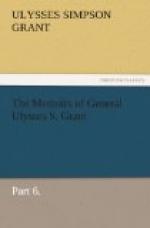When I left Appomattox I ordered General Meade to proceed leisurely back to Burkesville Station with the Army of the Potomac and the Army of the James, and to go into camp there until further orders from me. General Johnston, as has been stated before, was in North Carolina confronting General Sherman. It could not be known positively, of course, whether Johnston would surrender on the news of Lee’s surrender, though I supposed he would; and if he did not, Burkesville Station was the natural point from which to move to attack him. The army which I could have sent against him was superior to his, and that with which Sherman confronted him was also superior; and between the two he would necessarily have been crushed, or driven away. With the loss of their capital and the Army of Northern Virginia it was doubtful whether Johnston’s men would have the spirit to stand. My belief was that he would make no such attempt; but I adopted this course as a precaution against what might happen, however improbable.
Simultaneously with my starting from City Point, I sent a messenger to North Carolina by boat with dispatches to General Sherman, informing him of the surrender of Lee and his army; also of the terms which I had given him; and I authorized Sherman to give the same terms to Johnston if the latter chose to accept them. The country is familiar with the terms that Sherman agreed to conditionally, because they embraced a political question as well as a military one and he would therefore have to confer with the government before agreeing to them definitely.
General Sherman had met Mr. Lincoln at City Point while visiting there to confer with me about our final movement, and knew what Mr. Lincoln had said to the peace commissioners when he met them at Hampton Roads, viz.: that before he could enter into negotiations with them they would have to agree to two points: one being that the Union should be preserved, and the other that slavery should be abolished; and if they were ready to concede these two points he was almost ready to sign his name to a blank piece of paper and permit them to fill out the balance of the terms upon which we would live together. He had also seen notices in the newspapers of Mr. Lincoln’s visit to Richmond, and had read in the same papers that while there he had authorized the convening of the Legislature of Virginia.
Sherman thought, no doubt, in adding to the terms that I had made with general Lee, that he was but carrying out the wishes of the President of the United States. But seeing that he was going beyond his authority, he made it a point that the terms were only conditional. They signed them with this understanding, and agreed to a truce until the terms could be sent to Washington for approval; if approved by the proper authorities there, they would then be final; if not approved, then he would give due notice, before resuming hostilities. As the world knows,




